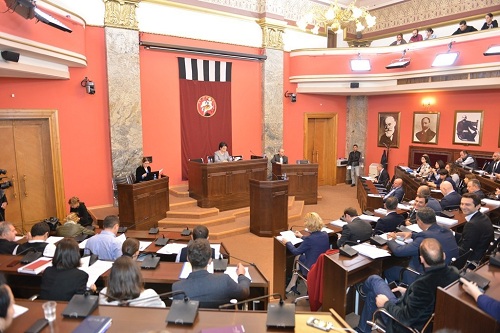
MPs Discuss Mandatory Gender Quotas Bill

Sitting of the committee for legal issues, October 5, 2017. Photo: parliament.ge
Parliamentary committee for legal issues gave its endorsement to a bill, which, if approved, would set mandatory quotas for women to help increase the number of female members in the Parliament and Sakrebulos (municipality councils).
The legislative proposal, which has been elaborated by the Task Force on Women’s Political Participation, a coalition of local and international organizations that advocate for gender equality and women’s political participation, and submitted to the Parliament with 37 000 signatures, envisages the introduction of the so called “zipper” system, where male and female candidates will appear alternately on party lists of candidates for the parliamentary and municipal elections.
According to the legislation, if a parliamentarian’s or Sakrebulo member’s mandate is terminated earlier than the end of his/her term, the next candidate of the same sex will take a seat in replacement.
The bill was supported by the parliamentary committee for legal issues unanimously on October 5, after being approved by the committees for human rights and regional development. The legislation will now be submitted to the parliamentary bureau, which will decide whether to put it to plenary voting or not.
If the bill is approved, it will apply to the party-list component and will result into at least 38 female lawmakers in the next parliament and at least 75 female lawmakers from 2024, when the country is to transition to the fully proportional parliamentary representation (currently, 77 seats are allocated based on proportional, party-list system and remaining 73 seats are distributed to majoritarian MPs from single-mandate constituencies).
Georgian Dream lawmaker Eka Beselia, who chairs the committee for legal issues, hailed the committee decision as “important.” “I support the idea of increasing women’s representation in public space, politics and eradicating the existing inequality… I am trying to convince more men, who are against this idea that it is a good decision and that the political environment needs it,” she said.
MP Salome Samadashvili of the opposition United National Movement party also expressed her support to the initiative, saying the introduction of quotas would increase demand for women politicians. “When there is a need to have more women in politics, it will appear that there are a lot of qualified women in this country, who can hold elected positions,” she noted.
The Georgian legislation currently envisages financial incentives for parties to include more women in their list of candidates. Rights groups, however, have been saying that this incentive has failed to address the under-representation of women in the Parliament (there are 23 female lawmakers currently).
Initiatives on setting mandatory quotas for women were discussed by the previous Parliamentary convocation as well. A proposal submitted by a group of civil society organizations offered the introduction of the “zipper” system; according to another proposal, sponsored by two GD ruling coalition lawmakers, political parties would be obliged to place women in every third position on their list of MP candidates. A part of lawmakers supported the idea, but the discussions on gender quotas failed to go beyond committee hearings.